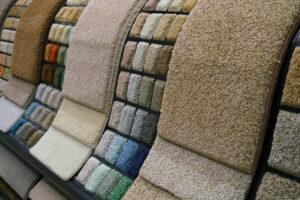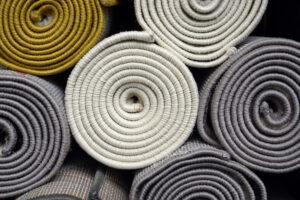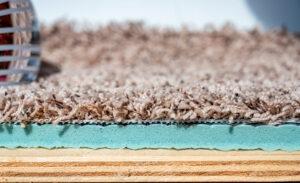What Styles of Carpet Exist & What’s The Right Choice?
How exciting! Carpeting can dramatically improve the look and comfort of your home. There are so many different styles, designs, textures, colors, materials, and levels of quality. There are also regional differences in carpet preferences that may influence your decision. This article will explore some of the important questions you should ask yourself about the styles of carpet that best fits your needs.
First, a little history
Rugs and carpets have been around for thousands of years. Archeologists have discovered fragments and evidence of rugs in tombs from Mesopotamia and Egypt dating to 2,000 BC. Natural fibers like silk and wool were common, and of course, all of them were handmade.
Initially, rugs were created for practical purposes like providing a warm and soft place to walk, sit and sleep. However, it wasn’t long before pride of ownership and craftsmanship created designs and forms of incredible intricacy.
Some of the rugs found in Persia and the Orient were used as an artist’s canvas to depict historical scenes and symbolic images. One of these rugs, The Spring Carpet of Chosroes, measured over 400 feet long and weighed thousands of pounds. It was also adorned with precious stones and metals.

In America, the carpet industry started in the late 1700s by William Sprague in Philadelphia. It wasn’t long before others followed and initiated their own patents. Carpets of all sorts became wildly popular across the country.
The first high-performance synthetic fibers were introduced in the late 1940s and early 1950s. Until then, all sorts of natural fibers were used, the most common being sheep’s wool.
Common types of carpet
Saxony
This style is also called velvet or plush, depending on where you live. A basic quality grade of this type of carpeting lasts approximately five years. The main characteristic of Saxony shows footprints and tracks from a vacuum in a different tone. Some people like this effect. It’s a personal choice.
Generally speaking, it’s a less than great choice for people who have kids or pets. High-traffic areas can become an issue—however, the better the quality grade, the better the performance and durability.
Textured Cut Pile
This type of carpet uses two or more tones of color and yarn of different tuft heights. Footprints and vacuum tracks are better disguised with this choice, and a little dirt here and there doesn’t show up as prominently with other designs. Performance and cost are similar to Saxony.
Frieze (pronounced “free-zay”) is structurally a cut pile; however, it is the most durable and expensive of the three cut pile styles. The tufts are twisted very tightly, inhibiting footprints and other impressions very well. You can expect more than 20 years as long as you maintain it properly in terms of durability and wear.
Berber Carpet or Loop Pile
These carpets are woven with level loops. The smaller the loop, the better they wear. Also, smaller loops do not mat down as easily as the larger looped versions. Smaller loops are also easy to clean. If you have young children or pets, be aware snags can be a problem and are difficult to repair.
Sculpted or cut-and-loop
As the name suggests, these carpets have both multi-level loops and tufts of varying pile heights and depths. This does a good job of hiding dirt, although seams can be difficult to match invisibly. This type of carpet is usually on the more economical end of the scale.

Variety of carpet fibers
Wool Carpet is a popular traditional choice, yet they can be prohibitively expensive, and the colors are somewhat limited. The wool is from sheep, and it provides excellent warmth underfoot.
Nylon is one of the first synthetic fibers to be used in the manufacture of carpets. It provides outstanding durability and wear. Resilience to heavy traffic is excellent, and this carpet is easy to keep clean. Staining can occur.
Polyester is soft and luxurious to the touch. It is stain-resistant and available in a wide variety of bright and vibrant colors. It can be less expensive than nylon, although it is not as durable. The softness is well worth it for people that don’t need to cover high and or heavy traffic.
Nylon polyester blends can provide the best of both fibers into one carpet. Be sure to check the specifications from the manufacturer to be sure you’re getting a true blend.
Olefin or polypropylene carpet is inexpensive and attractive. Unlike some of the other carpet fibers, it also resists fading from the sunshine that enters the room. It stands up well to high traffic areas like corridors, family rooms, and dining rooms.
How to determine the quality of carpet
Buying the most expensive carpet is not necessarily the best way to ensure quality. However, there are a few simple things you can do to make sure you’re getting the quality you want. You may even impress the salesperson with your new skills and expert questions.

Fold it backward
When you visit a showroom, ask the salesperson to show you samples of the most expensive and the least costly styles of carpet. Take one of the samples in your hands and fold it so that the backing from one half is touching the backing from the other half. Then look at the pile side. If you can see the backing easily, it’s a lower-quality carpet. Compare both to see the difference. Usually, the more backing you can see, the lower the quality.
Face weight
Ask the salesperson to tell you the face weight of any carpet in which you’re interested. The face weight refers to the number of ounces of fiber woven into a square yard. The higher the face weight, the higher the quality and resistance to crushing. A face weight of 20 ounces per square yard is the lowest level of quality, and 80 ounces of fiber per square yard is the highest level of quality.
The twist of your tuft
The tighter the twist of each fiber, the more durable the carpet. Aim for a number 5 level of twist or higher.
Determine the density
The density rating measures the thickness of individual fibers and how tightly packed together, they are woven. Here again, the higher the density, the better the quality.
BCF vs. Staple Fiber Construction
BCF stands for Bulked Continuous Filament. Staple fibers tend to shed more for the first twelve months. Unfortunately, this means you’ll be vacuuming quite often to keep up. Also, people with allergies may want to avoid Staple Fiber Construction for this reason.
Other considerations before you buy

Carpet pad
Almost important as the carpet you choose is the underpad. The underpad or carpet padding is an essential part of selecting a carpet. It will affect the final product’s durability, look, and comfort. Unfortunately, once installed, you don’t see the underpad, and many people are tempted to choose inadequate padding. This is a mistake.
Professional installation
When you’ve finally chosen your carpet and padding, you’re not done. Proper installation can add years of durability, look, and comfort. Keep this in mind when you are establishing a budget. All too often, inexperienced consumers are attracted to all-in-one carpet plus installation deals that provide shoddy installation.
As always, look for a long-standing retailer with a great reputation for quality and customer service.


